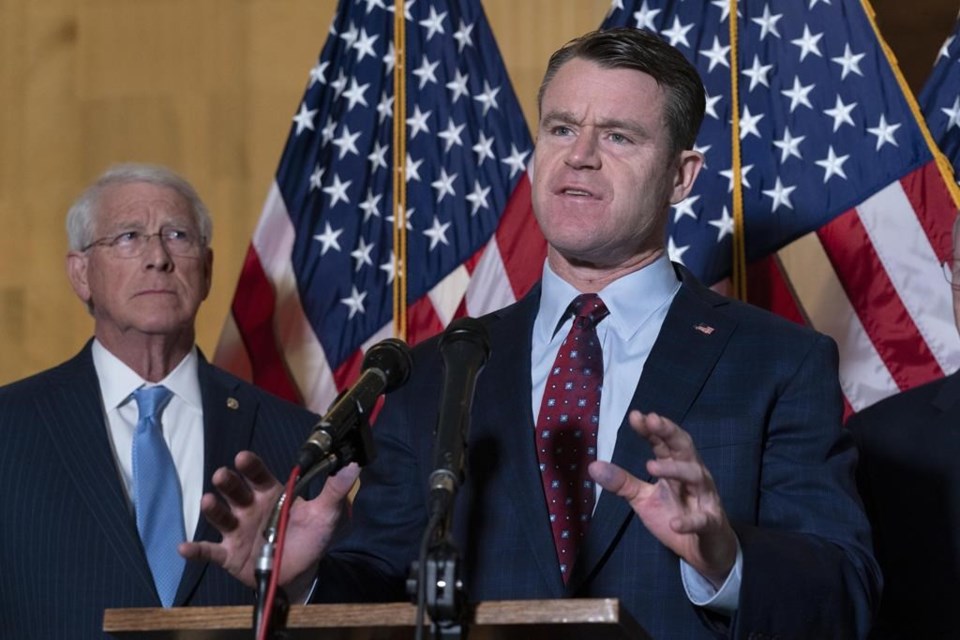INDIANAPOLIS (AP) — Indiana voters can begin casting early, in-person ballots Wednesday for the Nov. 8 election in which Democrats are looking for a backlash against the Republican-backed state abortion ban approved over the summer.
Republicans in the tightest races are largely avoiding the abortion issue while emphasizing economic topics as they seek to extend their dominance over statewide offices and the General Assembly.
Republican U.S. Sen. Todd Young is seeking reelection by following a front-runner strategy of mostly ignoring Democratic challenger Thomas McDermott ahead of their only televised debate scheduled for Sunday.
Democrats, meanwhile, are targeting the Indiana secretary of state’s race, in which former Mike Pence aide Diego Morales won the Republican nomination despite twice leaving jobs in that office after being written up for poor job performance.
Here is a look at top races on Indiana ballots:
U.S. SENATE
Young entered the campaign with huge fundraising and organization advantages over McDermott, who has been the mayor of Hammond, Indiana, since 2004 but is little known outside northwestern Indiana.
Indiana’s Senate race hasn’t seen the tens of millions in outside spending that it attracted four years ago when Republican Mike Braun defeated Democratic Sen. Joe Donnelly and in 2016 when Young won the Senate seat over former Democratic Sen. Evan Bayh.
Young avoided a primary challenge this year despite not fully embracing Donald Trump’s presidency — and not getting a Trump endorsement. Young voted to acquit Trump in his Senate impeachment trial but voted to uphold President Joe Biden’s election win.
McDermott, a lawyer and U.S. Navy veteran, has tried to build an appeal to working-class voters attracted to Trump while advocating congressional protection of abortion rights and federal marijuana legalization.
The lack of national groups spending money in the race when Democrats and Republicans are fiercely fighting for control of the current 50-50 Senate makes it difficult to see Young as vulnerable, although the abortion issue is a wildcard, said Paul Helmke, the former Republican mayor of Fort Wayne and the party’s 1998 U.S. Senate candidate.
“It might be something that gives a little new spark to Democrats in the state,” said Helmke, now an Indiana University public affairs professor. “But whether that’s enough to overcome the strong Republican mindset is hard to tell.”
SECRETARY OF STATE
Morales won the Republican nomination to become Indiana’s top elections office after talking up a push for tighter state voting restrictions and calling the 2020 presidential election a “scam” while pointing to unfounded claims Trump and his allies have made about other states.
Democrats criticize Morales as an “election denier” and see a chance to defeat him by pointing to him leaving low-level secretary of state office jobs in 2009 and 2011 after job performance write-ups.
Morales returned to state government as an aide on Pence's gubernatorial staff until Pence left to become Trump’s vice president in 2017.
Democratic candidate Destiny Wells, an attorney and Army Reserve lieutenant colonel, says Morales is “sowing seeds of fear and doubt” about elections and that the secretary of state should focus on improving Indiana’s troubles with low voter turnout. Libertarian Jeff Maurer, who is also on the ballot, is advocating improved statewide paper versions of all ballots and independent audits of vote tallies in all counties.
U.S. HOUSE SEATS
Republicans are making their first serious challenge in several decades for the northwestern Indiana congressional district that has long been a Democratic stronghold.
Black U.S. Air Force veteran Jennifer-Ruth Green is challenging Democratic Rep. Frank Mrvan, who won his first term in 2020 in the 1st District that hugs Indiana’s Lake Michigan shoreline. Democrats have typically won there by large margins, but Trump closed the gap by appealing to working class voters in the district that has some of the country’s largest steel mills.
Green, who is a lieutenant colonel in the Indiana Air National Guard, touted herself as a Trump supporter during the Republican primary campaign. Democrats have focused much of their criticism on her opposition to abortion rights.
STATE LEGISLATURE
Democrats are trying to pick up enough state legislative seats to break the Republican supermajorities that have left Democrats largely powerless against conservative proposals such as the abortion ban that's been blocked by a court order. Democrats need to gain five seats in the 100-member House needed to break the two-thirds supermajority that allows Republicans to act even if no Democrats are present.
New district maps taking effect with this election protect most current Republican lawmakers, but Democrats are targeting some Republican-held seats in the northern suburbs of Indianapolis and in the South Bend and Fort Wayne areas.
State Democratic Chairman Mike Schmuhl said the abortion ban is an example of “government overreach” stemming from the decade-long Republican legislative supermajority.
“I think that really crystallizes things for people,” Schmuhl said. “That something so personal, that really should be between a woman, her family, her faith, her doctor, have Republican politicians kind of step in front of those folks and say, ‘Oh, no, we’re going to make those decisions for you.’”
Tom Davies, The Associated Press




